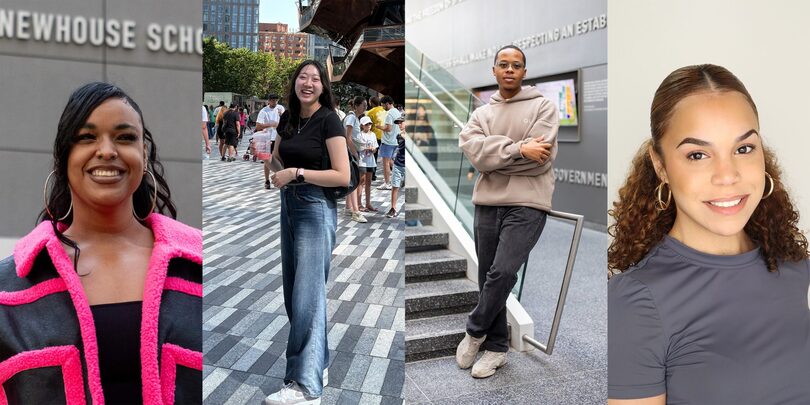Bandier’s music business master’s embraces multifaceted learning in 1st year

The first cohort of students in Newhouse’s music business master’s program began this fall. The joint effort with VPA looks to expand the Bandier program’s undergraduate foundation, blending finance and law into music-focused classes. Taite Paradise | Contributing Photographer, Courtesy of Soolynn Lee, Leonardo Eriman | Photo Editor, Courtesy of Marie-Elise Ambroise
Get the latest Syracuse news delivered right to your inbox.
Subscribe to our newsletter here.
UPDATE: This story was updated at 7:36 p.m. on Oct. 9.
Syracuse University’s first class of Bandier Music Business Master’s Program graduate students say they are navigating an evolving program.
SU announced the master’s program in August 2024, hoping to expand the undergraduate Bandier program’s education in the recording and entertainment industries. In July, the program saw its first group of enrolled students during its required summer session.
“There was an opportunity to take all the things that we had learned were working through the undergrad lens and apply it to the graduate experience,” Program Director Bill Werde said.
For Marie-Elise Ambroise, being part of the first cohort has given her the confidence to grow as both a student and a professional this semester, she said.
“I’m starting to feel that validation that I belong here, which is something I’ve been craving throughout my whole undergrad experience,” Ambroise, who received her undergraduate degree last May, said.
While Bandier undergraduate students cannot apply to the program after graduation, as the curricula is similar, it’s open to students from other programs pursuing a master’s degree. SU alumni accepted to the program can apply for the Forever Orange Scholarship and receive a 50% reduction on tuition.
With a partnership between the College of Visual and Performing Arts and Newhouse School of Public Communications, the program’s “multi-disciplinary approach” allows students to learn a variety of skills, from music theory to finance, Werde said.
The graduate program aims to develop students’ resourcefulness, resilience and integrity — key traits to “tackle” the industry, Werde said.
“Those are the attributes that are going to carry you through a very fluid, very dynamic and chaotic professional landscape,” he said.
Graduate student Hadiya Ray said the range of courses included in the program, from her music-focused classes to finance and law, has prepared her to enter the music business after graduation. She said the multifaceted curriculum will shape students into industry professionals.
Ambroise said the program’s summer session, offered in July, served as a “foundation” for getting to know, respect and network with her peers. She said the approach was a “great transition,” allowing her to take courses about music terminology, working with artists and being comfortable in the studio.
“I like how we started off strong, but not too strong to the point that it was intimidating,” Ambroise said. “(Bill) sets it up in a way that we’re able to really grow together as teams, but also individually as well.”
Along with classes on campus, students in the program are required to spend one semester at SU’s Dick Clark Los Angeles Program, while completing one of their two required internships.
Soolynn Lee, a student in the program, said the opportunity to spend a semester in LA, the “hub of the industry,” while still keeping a proximity to New York City in Syracuse was a defining aspect of her choice to join the program.
Both Lee and Ambroise expressed their excitement for the LA semester and the opportunity to attend the South by Southwest festival and conference in Texas. Lee said she’s looking forward to the opportunity to watch up-and-coming artists and connect with industry professionals at the conference.
Ambroise also said the diversity within the Bandier program has been key to her growth. While usually being the only person of color in her undergraduate classes, Ambroise said she feels represented and comfortable expressing her ideas in the graduate program.
“I feel like I had this newfound confidence because the people in the room look like me, which is really important,” Ambroise said. “Bill instilled professionalism in us, and how to approach connections and networking.”
Ray echoed her sentiment, saying that in her past academic experiences, she rarely walked into classrooms where most people looked like her. Now in the Bandier program, she’s “pleasantly surprised” by the welcoming nature and fellow students’ passion and ambition.
“What Bill truly did was he really made sure that people of all different walks of life were in the room for our master’s students,” Ray said.
Lee, however, said when she arrived on campus, she was frustrated by the lack of international diversity in the program. As a fan of Japanese music, she said her peers’ United States-centric focus and disinterest in the international industry disappointed her.
“I’m glad I’m here, but that was a shocker for me,” Lee said.
Similar to Bandier undergraduates, graduate students attend the David M. Rezak Music Business Lecture Series — a weekly conversation between an industry professional and Bandier students. Students also have opportunities to network with the speakers by signing up for exclusive one-on-one meetings.
Ray, Lee and Ambroise all said they feel Werde created opportunities for students to express their concerns, and the program is very receptive to feedback.
“I’m happy to be here,” Ambroise said.“I feel like there are still kinks that we’re working out in the program, but I appreciate that they’re open to hearing from our people.”
Correction: A previous version of article misstated that the graduate Bandier students compete with undergraduates for one-one-one networking sessions and weren’t prioritized. Graduate students have more representation in the one-on-ones, and there’s no evidence the graduate students are not prioritized. The Daily Orange regrets this error.





